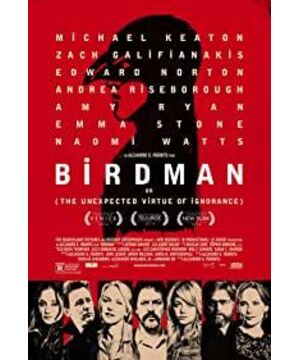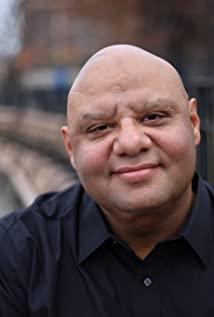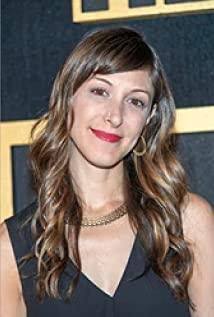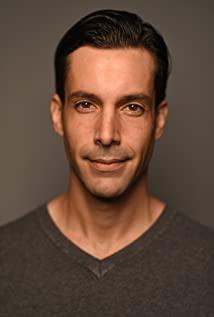This film, which has won Best Directing, Best Picture, Best Cinematography, Best Original Screenplay, is very technical. I was in the movie theater wondering if such a simple plot wasn't understood by me, and went back and checked the wiki to make sure that what I saw was probably what it wanted to show. The vast majority of the awards it has won are also proof of this in terms of technical handling. I felt very confused when watching the movie on the spot, because most of the characters in the play are also the characters in the play, and it is often difficult to distinguish which is the real plot and which is the performance. Especially when Mike is acting in the play in the play, I really can't tell whether he is acting according to the script in the play or is talking nonsense. The beginning of the film did not explain the ins and outs of the story, which left me in a fog. The male protagonist embodies the bitterness and madness of Hollywood middle- and lower-level practitioners who are eager to become famous or regain their reputation. They want to make good films but have no money for special effects, so they can only play with literature and art. Actors are often unreliable, and funding, crew and family often go wrong. Emma Stone's eyes in this film are really big, and it's a bit scary.
I heard that a major feature of this film is that the whole film is shot in one shot in chronological order, and there are very few post-editing edits. But I think the sophistication of this approach may be worthy of praise from experts, but not as a reason to attract audiences. We only care about the visual effects, as for whether the film is finished in one or several times, it is not really necessary to pay attention. If one shot is too difficult, why not switch to multiple shots? If you have to rely on this so-called "selling point" to win the award, it will be even more ridiculous. It's like a foodie evaluating a dish without caring whether it was cooked on gas or charcoal. If it is said that the three technical awards it has won are well deserved, these three awards should be cancelled. Isn't the ultimate goal of the film to please the audience? The experts on the awards committee think that the split between themselves and the audience is not conducive to the development of the industry.
What is worth mentioning about the plot is the interweaving of the drama within the play and the plot of the main drama, as well as the triple resonance formed by the drama in the play, the main drama and the evaluation received by the film in reality. The play "what we talk about when we talk about love" in this film has a real work, but unfortunately I didn't understand the plot when I watched the film. A glimpse of the impression is that the character played by the male protagonist in the play finds himself to be nothing more than a little person who is unimportant and uncared for, and at the end proves this thoroughly by committing suicide. So according to my conjecture, the male protagonist of the main drama is hoping to escape the fate of the little person who was forgotten in the main drama by playing an ignored character in the drama. A stark reflection of this is the superhero birdman who has been living in the hero's memory and reflects his once brilliant feathers. The male protagonist thinks that he has superpowers and can fly above the heads of all beings, but he has to face reality after the fantasy flight is over to play a small character in a boring little script. He thought he was admired by everyone for overlooking the world. In fact, people were curious about whether the guy standing on the roof was really jumping off the building or was just shooting a movie. High ideals and cruel reality collide time and time again, moving forward in broken dreams and relying on new dreams to numb the scars cut by the previous fragments, until the new dream is shattered again by a crueler reality, probably many people at the bottom are unwilling to be mediocre. The true portrayal of the little people, right?
The last preview of the drama in the play is also near the end of the main drama. The male protagonist earned a so-called "Super-Realism" evaluation by shooting himself in the nose. This is probably more irony than compliment, right? And not to mention whether the male protagonist will be prosecuted and convicted for illegally possessing and firing a weapon in a public place, how many noses does he have that he can shoot off in the preview? I didn't understand the ending in the theater. After reading the introduction of the drama in the play, it can be understood as the last interweaving of the main drama and the drama in the play: the male protagonist climbed out of the window of the hospital on a high floor, and subconsciously, he should think that he has finally changed back to the old bird feather. The glittering birdman can fly freely; as for the mysterious smile of the male protagonist's daughter in front of the open window after finding out that the male protagonist is missing, the meaning has not yet been guessed. Perhaps after the hero committed suicide in the corresponding play, the heroine walked into his room.
The difference between this film and even beyond the past description of filmmaking is that the filming, production and release of this film in reality form a contrast with the plot and the drama within the play, allowing the interaction between the plot and the drama within the play. It has developed into a triple resonance of the plot, the drama in the play and the reality. The director and crew were also limited by the low production costs faced by the director and the crew in the play (the actual cost of the film is about 15 million US dollars, and the box office has so far been about 85 million US dollars), so the filming technique has been brought into play to a very high level. Level, most of the film is completed in one shot (one shot), and there are very few post-editing. In this sense, the directors and crew in reality used their actions to laugh at the directors and crew in the plots they filmed and created, and declared the success of their own movies in reality by interpreting the failures of making movies in the play. Therefore, the actual production process of this film is also an integral part of the plot of the film itself. This is beyond the traditional "movie film".
View more about Birdman or (The Unexpected Virtue of Ignorance) reviews











